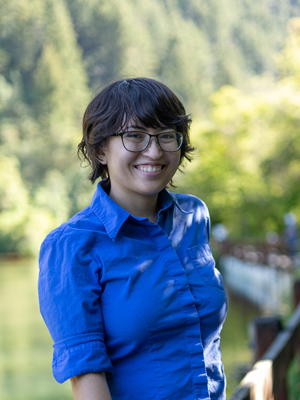Congratulations to Korena Klimczak on being selected as the Student Spotlight Award winner for January 2024!
The purpose of this award is to highlight students who are doing important work in the CBS community whether for research, clinical, and/or volunteer-humanitarian efforts.
This is a way to highlight their achievements, let the ACBS community know important work students are doing, and possibly provide a platform for mentoring, collaboration, professional development, and conversations around highlighted areas.
Learn more about Korena Klimczak
Background of CBS Research/Clinical/Volunteering efforts/achievements:
I became involved with the CBS community in 2019, when I first began graduate school at Utah State University under Dr. Michael Levin’s mentorship. I have since pursued lines of research investigating ACT-based digital mental health interventions, and issues related to adherence, engagement, and implementation. This research includes the development of a novel ACT-based peer coaching intervention to improve adherence to the 10-week online ACT self-help program called ACT Guide. I tested this peer-coaching intervention through an RCT and subsequently implemented it as an available service for Utah State University student users of ACT Guide. I have additionally conducted a meta-analysis on online ACT interventions and have taken lead roles in developing online self-guided ACT-based interventions that are or will be available for public use outside of research contexts. This includes a single-session ACT program that takes 45 minutes to complete called ACT Guide Lite, and an online 6-session ACT program tailored to autistic adults.
I have also provided service to the CBS community through my role as a SIG-leader for the ACTing with Technology SIG over the past two years. In this role, I revamped the SIG website (https://actingwithtech.wordpress.com/) to make it more openly accessible as a resource for researchers and therapists seeking information about technology-supported ACT and CBS work, and have organized online talks, panels, and networking events to facilitate community growth within the SIG. I have also given workshops on ACT, training therapists on ACT more generally as well as on digital tools for enhancing clinical practice.
Autobiography:
I grew up in south Florida and completed my BA in Psychology in Virginia at Old Dominion University in 2019. I have enjoyed my time in Utah over the past five years as a student in the Combined Clinical and Counseling Psychology PhD program at USU with Dr. Michael Levin as my mentor. I have always had a fascination with technology and the internet’s role in culture, society, and the human condition. I ultimately wanted to pursue a career where I can help shape and manifest technologies that support people in living meaningful lives and pursued this through studying psychology. I want to capitalize on technology’s potential to increase the accessibility of mental health resources for all, and to offer new novel tools for helping people live better lives that would not otherwise be possible. This led me to my research interest in clinical applications of technology, with a specific focus on ACT. I care deeply about making the products of research relevant and useful to real-world contexts, and thus prioritize work that translates evidence-based findings to real-life services. I also enjoy implementing advanced statistical methods and rigorous methodology, as these tools can help shed light on making sense of data in interesting ways and make clinical psychology a better science. Outside of work, I love playing games, picking up new hobbies, and doing deep dives into interesting topics, some of these over the past few years including roller skating, mechanical keyboards, speculative evolution, and the history of tattooing!
Future goals:
I hope to use my skills as a clinical psychologist to help implement and improve real-life digital interventions available to the public.
Publications:
Davis, C. H., Klimczak, K.S., Aller, T. B., Twohig, M. P., & Levin, M.E. (In press). Reach, adoption, and maintenance of online acceptance and commitment therapy at a university: An implementation case study. Psychological Services.\
Klimczak, K.S., & Levin, M.E. (2023). Acceptance and commitment therapy. In: Friedman, H.S., Markey, C.H. (Eds.), Encyclopedia of Mental Health (Third Edition), vol. 1. Elsevier, Academic Press, pp. 1–9. https://doi.org/10.1016/B978-0-323-91497-0.00121-1.
Klimczak, K. S., Schwartz, S. E., Donahue, M. L., Capel, L. K., Snow, J. L.*, & Levin, M. E. (2023). Disentangling trait and state psychological inflexibility: A longitudinal multilevel approach. Journal of Contextual Behavioral Science, 29, 13-22. https://doi.org/10.1016/j.jcbs.2023.05.006
Klimczak, K. S., San Miguel, G. S., Mukasa, N. M., Twohig, M. P., & Levin, M. E. (2023). A systematic review and meta-analysis of online Acceptance and Commitment Therapy as a transdiagnostic self-help intervention. Cognitive Behaviour Therapy, 52(3), 269-294. https://doi.org/10.1080/16506073.2023.2178498
Klimczak, K. S., Twohig, M. P., Peacock, G. G., & Levin, M. E. (2023). Using peer-support coaching to improve adherence to online ACT self-help for college mental health: A randomized controlled trial. Behaviour Research and Therapy, 160, 104228. https://doi.org/10.1016/j.brat.2022.104228
Krafft, J., Klimczak, K. S., & Levin, M. E. (2022). Effects of cognitive restructuring and defusion for coping with difficult thoughts in a predominantly white female college student sample. Cognitive Therapy and Research, 46, 86-94. https://doi.org/10.1007/s10608-021-10242-4
